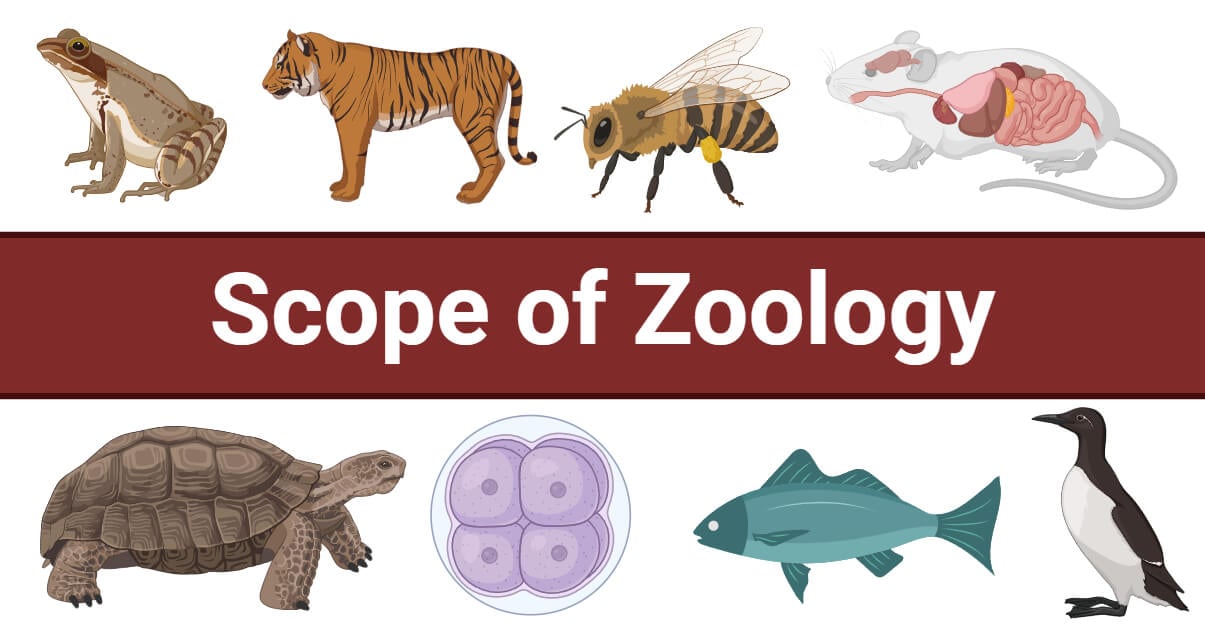Zoology, also known as animal biology, is a branch of science that deals with the study of animals.
This field covers a wide range of topics related to animals, such as their development, structure, distribution, habits, evolution, and classification. Zoology provides insights into the incredible diversity on Earth, from small insects to giant mammals. This field of science plays an important role in understanding the animal kingdom and contributes to various other fields as well.

Interesting Science Videos
Historical Background of Zoology
- In prehistoric times, humans were linked to animals by hunting, where animals served as sources of food. As human culture developed, animals became part of different folklore and were acknowledged as fellow living beings.
- When humans started living in cities, urbanization increased the demand for animal products leading to the domestication of animals which eventually provided a more systematic view of animal life.
- Ancient Greek philosopher Aristotle was one of the early scholars who observed and documented information about animals. His detailed descriptions of various living organisms contributed to a more organized understanding of the natural world.
- The 17th and 18th centuries saw advancements like the cell concept, microscopic observation, and the analysis of animate systems. Scientific advancements and reforms in the 18th century, including Carolus Linnaeus’ nomenclature further shaped zoology.
- One significant advancement in zoology happened when Charles Darwin proposed the theory of evolution by natural selection. This theory brought a revolution in the study of animals.
- Then, the discovery of DNA as the genetic material of life led to further advancements in understanding the relationships between different animals in terms of evolution. Mendel’s work on heredity factors played an important role in understanding evolution.
- The historical background of zoology progresses from prehistoric survival instincts to a complex, interdisciplinary science. Different scientific disciplines and approaches have helped us understand the complex nature of animal life on Earth.
Branches of Zoology
Zoology is divided into various branches that focus on a specific aspect of animal life or a particular group of animals. Some of the main branches of zoology are:
- Anatomy is the study of the structure of animals, including their organs, tissues, and cells.
- Physiology is the study of functions and processes of living organisms, understanding how animals survive and maintain bodily functions.
- Ecology studies how animals interact with their surroundings, including ecosystems and food chains. This involves studying food webs, predator-prey relationships, and the ecological impact of different species.
- Embryology studies how animals grow and develop, starting from fertilization to the formation of organs. This branch of zoology studies the stages of development in different animals, from the embryo to a fully formed individual.
- Ethology is concerned with the study of animal behavior in their natural environment, including phenomena like mating, feeding, and social interactions.
- Evolutionary biology studies the processes of evolution and the evolutionary history of animals, exploring how species change over time.
- Paleontology involves the study of fossils to understand the history of life on Earth, including extinct species and their evolution.
- Genetics studies the genetic makeup of animals, exploring the inheritance of traits, genetic variation, and the role of genes in shaping the characteristics of different species.
- Comparative zoology involves the comparison of different animal species to identify similarities and differences in their anatomy, behavior, and evolution.
- Entomology is the study of insects, exploring their anatomy and behavior. This involves the study of the life cycles of insects, their roles in pollination, and their impact on ecosystems.
- Ornithology is the study of birds including their migration patterns and how different species adapt to different environments.
- Ichthyology is the study of fish. Ichthyologists examine the feeding habits and reproductive behavior of various fish species.
- Herpetology deals with the study of reptiles and amphibians, exploring their anatomy and habitats.
Scope and Career Opportunities of Zoology
The scope of zoology is diverse and provides various opportunities for individuals to specialize in different fields according to their interests and career goals. Some of the scope of zoology and potential career paths are:
- Research scientists conduct comprehensive studies on animal biology, behavior, and ecology. There are career opportunities in research institutions, universities, or private organizations.
- Wildlife biologists study and manage wildlife populations, contributing to conservation efforts. Employment prospects include wildlife reserves, national parks, or environmental organizations committed to wildlife preservation.
- Zoological educators engage in educating the public about animals, biodiversity, and conservation. Employment opportunities can be found in zoos, museums, or educational institutions as teachers or curators.
- Zoo curators manage and care for the animals in a zoo, designing educational programs, and actively contributing to conservation initiatives. Positions as curators are available in zoos, aquariums, or wildlife sanctuaries.
- Aquatic biologists study marine and freshwater ecosystems, including the diverse organisms within these environments. Employment opportunities include work in marine research institutions, environmental agencies, or aquatic conservation organizations.
- Conservation biologists work towards protecting and preserving ecosystems and developing strategies for endangered species. They can work in conservation organizations, non-governmental organizations (NGOs), or government agencies dedicated to biodiversity conservation.
- Veterinarians provide medical care for both domestic and wild animals. They work in veterinary practices, animal hospitals, or wildlife rehabilitation centers.
- Molecular biologists in zoology use molecular techniques to study the genetic aspects of animals. Research positions are available in genetics labs, pharmaceutical companies, or biotechnology firms.
- Biomedical researchers study animals for biomedical advancements. Opportunities exist in medical research institutions, pharmaceutical companies, or government health agencies.
- Science communicators play a vital role in connecting scientific knowledge with the public through effective communication. Opportunities for such roles exist in areas like science journalism, science writing, and outreach programs.
Importance of Zoology
- Zoology contributes to understanding the diversity of animal species. This involves identifying new species, studying their morphological characteristics, and their ecological roles.
- Zoology plays an important role in studying and conserving the rich diversity of animal species. Zoologists actively contribute to conservation efforts by studying endangered species, identifying threats to biodiversity, and developing strategies to protect ecosystems.
- The field of zoology also contributes to pest management, enhancing livestock breeding, and addressing challenges in agriculture.
- Zoological research has implications for human and animal health. Understanding the anatomy and physiology of animals contributes to advancements in veterinary medicine, and comparative studies can have applications in human medicine.
References
- BioExplorer.net. (2024, January 01). Branches of Zoology. Bio Explorer. https://www.bioexplorer.net/divisions_of_biology/zoology/.
- Biologydictionary.net Editors. (2017, April 27). Zoology. Retrieved from https://biologydictionary.net/zoology/
- Hanson, E. Dorchester (2023, October 30). zoology. Encyclopedia Britannica. https://www.britannica.com/science/zoology
- Zoology – Introduction, Branches and Importance of Zoology (byjus.com)
- Zoology – Introduction, Branches and Importance of Zoology (geeksforgeeks.org)
- Zoology – New World Encyclopedia
